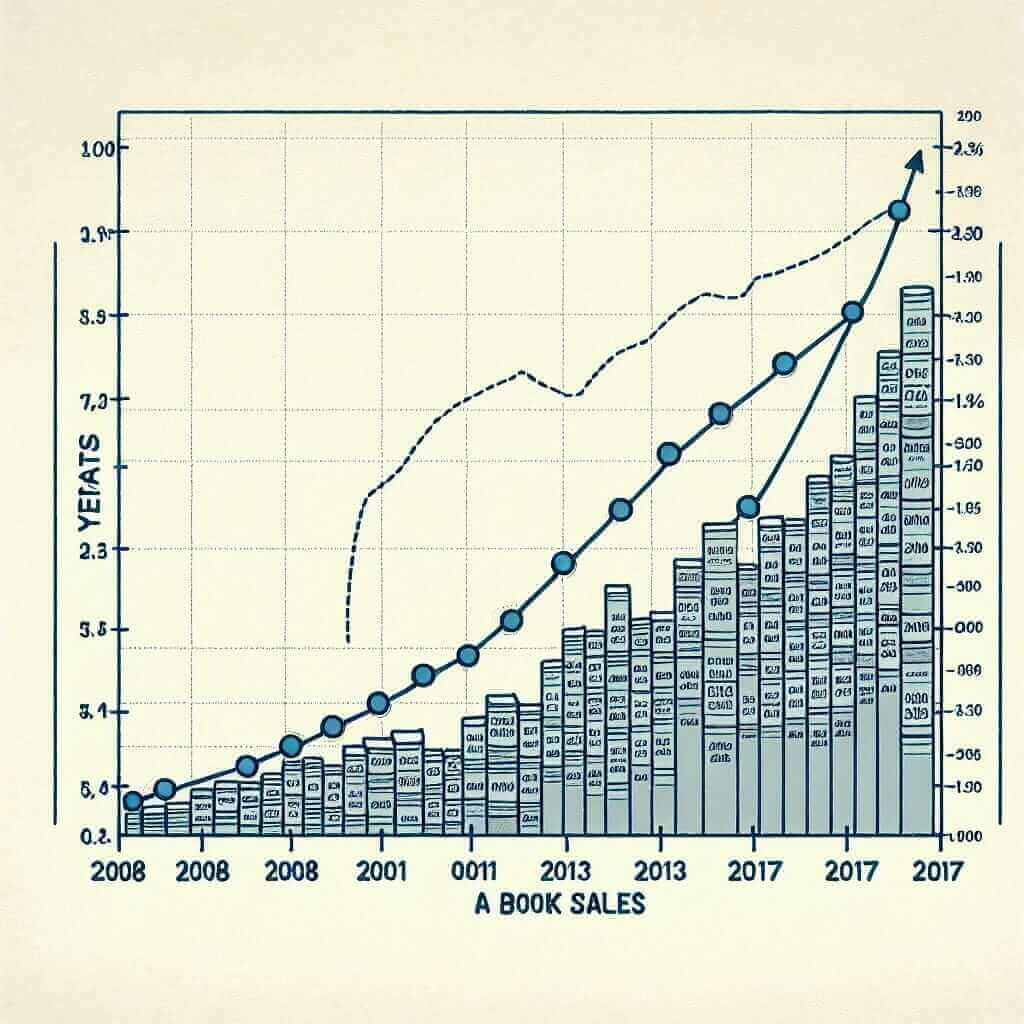The IELTS Writing test is designed to assess your ability to produce written English in an academic setting. Understanding the different task types is crucial for achieving a high score. This article will guide you through the different types of IELTS writing tasks, complete with examples and practical tips to help you excel on test day.
IELTS Writing Task 1: Identifying and Describing Data
In Task 1 of the IELTS Academic Writing test, you’ll be presented with visual information in the form of a graph, chart, table, diagram, or a combination of these. Your task is to:
- Identify the key features of the data.
- Summarise and report the main trends.
- Make comparisons where relevant.
- Write a clear and concise report in your own words, without interpreting the data or giving your opinion.
Examples of IELTS Writing Task 1:
- Line Graph: Illustrating the average monthly rainfall in two different cities over a year.
- Bar Chart: Comparing the percentage of men and women employed in various professions.
- Pie Chart: Showing the proportion of energy produced from different sources in a country.
- Table: Presenting data on the population of different age groups in a region.
- Process Diagram: Explaining how something works or how something is made.
Sample IELTS Writing Task 1 Question (Line Graph):
The line graph below shows the number of books sold by a bookstore from 2008 to 2017.
Summarise the information by selecting and reporting the main features, and make comparisons where relevant.

Sample Band 8 Response:
The line graph illustrates the sales figures for a bookstore over a decade, from 2008 to 2017. Overall, book sales demonstrated a fluctuating trend throughout this period.
In 2008, the bookstore sold approximately 10,000 books. Sales then rose steadily until 2011, reaching a peak of around 18,000 books. However, the subsequent years witnessed a decline, with figures dropping to 12,000 in 2013.
From 2014 onwards, there was a gradual upward trend in sales, though the 2017 figure of 15,000 books remained lower than the 2011 peak. Notably, the final year, 2017, saw a more pronounced increase in sales compared to the previous two years.
IELTS Writing Task 2: Essay Writing
Task 2 of the IELTS Writing test requires you to write an essay in response to a given point of view, argument, or problem. This task assesses your ability to:
- Present a clear and logical argument.
- Support your ideas with relevant examples and evidence.
- Use a range of vocabulary and grammatical structures accurately.
- Write in a formal and objective style.
Common IELTS Writing Task 2 Essay Types:
- Opinion Essay: Do you agree or disagree with a given statement?
- Discussion Essay: Discuss both sides of an argument and provide your own opinion.
- Advantages and Disadvantages Essay: Analyze the benefits and drawbacks of a particular trend or development.
- Problem and Solution Essay: Identify a problem and propose solutions.
- Two-Part Question Essay: Answer two related questions in your essay.
Sample IELTS Writing Task 2 Question (Opinion Essay):
Some people believe that social media has had a negative impact on social relationships. To what extent do you agree or disagree?
Give reasons for your answer and include any relevant examples from your own knowledge or experience.
Sample Band 8 Response:
In today’s interconnected world, social media has become ubiquitous, profoundly impacting the way we interact. While some argue that these platforms have eroded the quality of social relationships, I firmly believe that their overall effect has been positive, albeit with some caveats.
On the one hand, excessive social media use can lead to social isolation and superficial connections. Individuals may spend countless hours online, neglecting face-to-face interactions with family and friends. Moreover, the carefully curated images and updates on social media often present an idealized version of reality, fostering a sense of inadequacy and envy in others.
However, the benefits of social media far outweigh these drawbacks. Social networking platforms have broken down geographical barriers, allowing people to connect with like-minded individuals and build relationships across borders. For instance, online communities dedicated to hobbies, professions, or support groups provide a sense of belonging and shared experience. Additionally, social media has become an invaluable tool for activism and social change, mobilizing individuals around important causes.
In conclusion, while acknowledging the potential negative impacts of excessive use, I am convinced that social media, when used responsibly, is a powerful tool for fostering connection, building communities, and promoting positive social change. It is ultimately up to individuals to use these platforms mindfully and strike a balance between the virtual and real world.
Common Errors to Avoid
- Task Achievement/Response: Not addressing all parts of the task, going off-topic, or not writing enough words.
- Coherence and Cohesion: Lack of clear organization, inappropriate paragraphing, and insufficient use of linking words.
- Lexical Resource: Limited vocabulary range, incorrect word choice, and repetition.
- Grammatical Range and Accuracy: Grammatical errors, inappropriate sentence structure, and overuse of simple sentences.
Tips for Success
- Practice Regularly: Familiarize yourself with the task types and time constraints.
- Analyze Sample Answers: Pay attention to the structure, language, and arguments used in high-scoring essays.
- Expand Your Vocabulary: Learn and use a wide range of academic vocabulary.
- Improve Your Grammar: Focus on grammar rules and sentence structures relevant to academic writing.
- Get Feedback: Have your writing evaluated by a teacher or tutor to identify areas for improvement.
By understanding the different IELTS Writing task types, practicing regularly, and refining your writing skills, you can confidently approach the IELTS Writing test and achieve your desired score. Good luck!